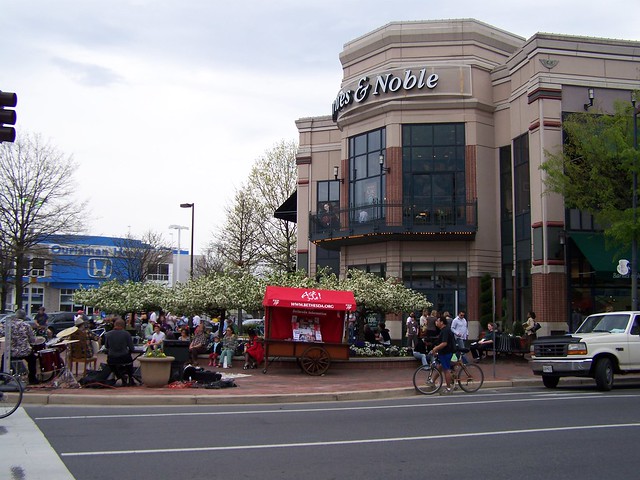Parking districts vs. transportation/urban management districts: Part one, Bethesda
While the Bethesda commercial district in Maryland is centered around a Metro Station, the reality is that many patrons are area residents who find it most convenient to get to and from the district by driving.
To provide parking and other services, a "Parking Lot District" was created and is funded by a tax on certain properties for foregone parking and parking charges at meters and in structures.
Besides maintenance and debt service on parking structures, the funding mechanism pays for the Bethesda Urban Partnership which provides management, clean and safe, and marketing services for the district as well as certain transit services (like the Bethesda Circulator bus service).
Skimming the report, I'd say besides suggestions from GGW about raising fees slightly and/or charging parking fees where they aren't assessed currently ("Bethesda's parking district is going broke while its most popular garage remains free"), there need to be two other fundamental changes to how the district is conceptualized and funded.

One of the functions of the Urban District is marketing and promotion. Note the area information kiosk at the Barnes and Noble fountain. A similar kiosk is also present outside of the Bethesda Metro Station.
1. The district should be re-termed as either a Transportation Management District or an Urban Management District that includes mobility management functions.
This might be a problem in terms of State of Maryland or Montgomery County enabling legislation, but the reality is that Bethesda's "parking district" handles and pays for more than parking.
I recommend calling it an Urban Management District, with the same functions it has currently.
This would better align the title/name of the special services district with its functions.
It also makes clear that the district already addresses multiple transportation modes, not just parking, in managing transportation demand for the area.
2. The system for assessing property charges on buildings within the district should be changed.
Besides parking charges, the primary source of revenue for the district is an assessment charge on those buildings which don't provide "enough parking" based on zoning regulations.
Whether or not they pay into it, the reality is that all buildings in the "Parking Lot District" benefit from the urban management and transit services provided within the district.
Therefore many of the properties are "free riders" because they don't pay towards the urban management and transit functions consumed by the tenants. and indirectly benefiting the property owners.
The free rider problem will get worse when zoning regulations take effect that reduce parking requirements, further reducing the number of properties paying into the Bethesda "Parking Lot District."
A two tier property assessment system should be developed as a funding element of a redefined Urban Management District so that (a) all buildings pay a base assessment for non-parking related services delivered to the district, (b) with an additional assessment levied on those buildings not providing enough parking according to zoning regulations.
This change would ensure full funding to cover the debt service, operational costs for the district, maintenance for the facilities, and transit services presently provided.
Labels: car culture and automobility, commercial district revitalization planning, parking and curbside management, public finance and spending, special tax districts, transportation demand management






0 Comments:
Post a Comment
<< Home